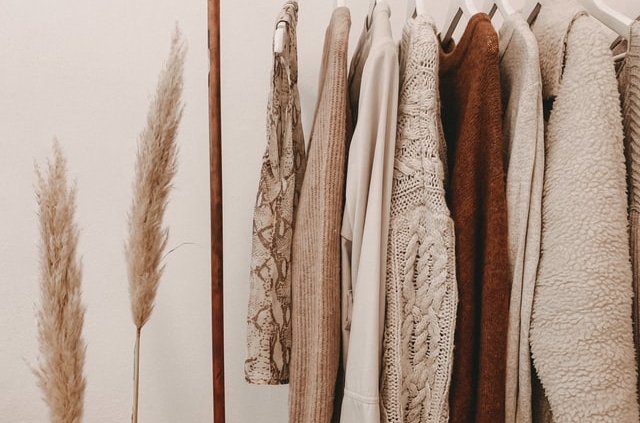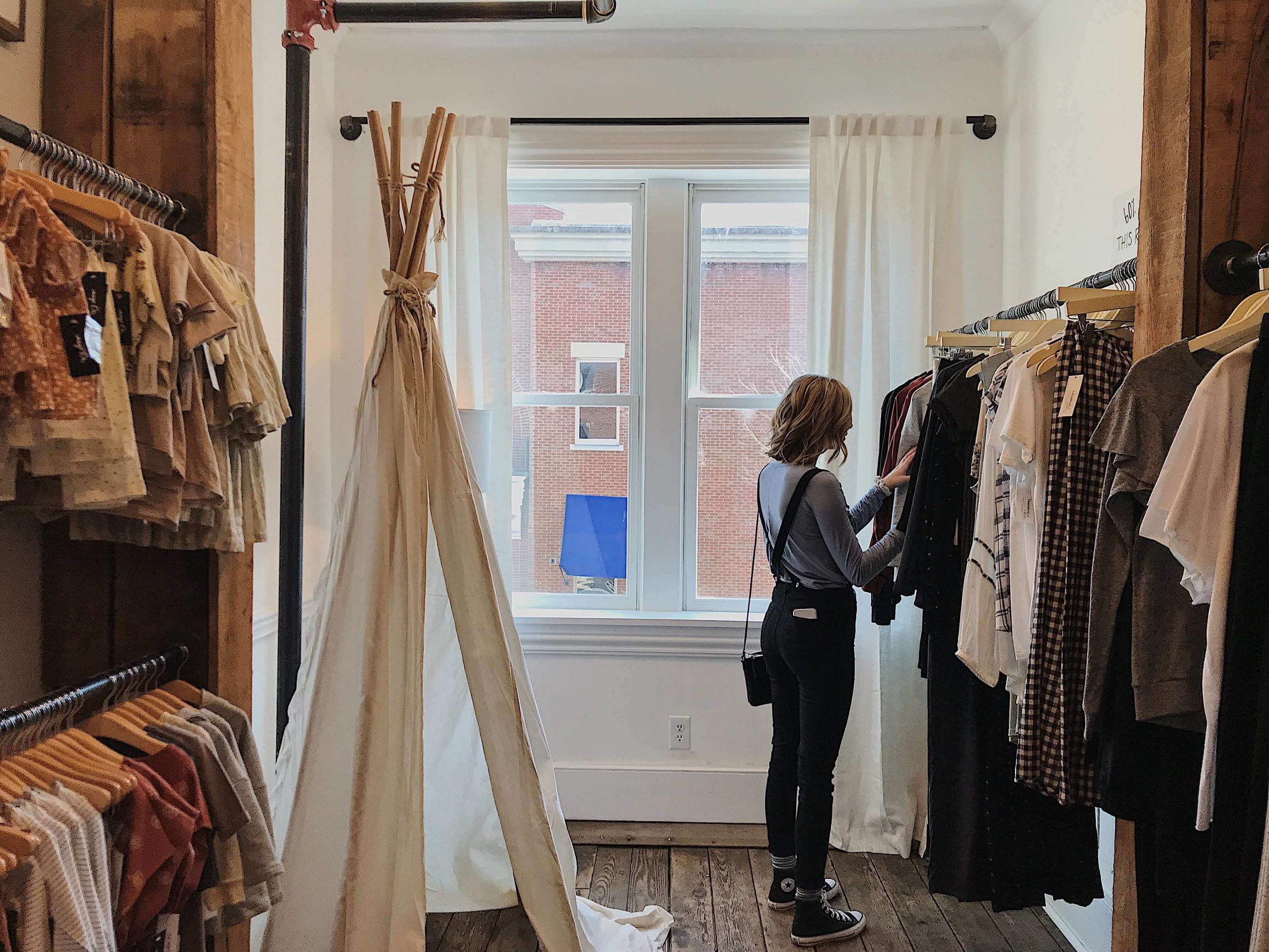Your Sustainable Shopping Guide
With consumers’ rising focus on sustainability and ethical business practices, the fashion industry has been the target of much criticism. Follow this sustainable shopping guide to navigate the issues and make informed purchasing decisions, including where to shop and what products to buy.
The Current Fashion Industry
The fashion industry produces an enormous amount of waste annually both throughout the stages of production and at the end of the season when they discard “old” unsold products. This is primarily a result of industrialization and changing consumer expectations. When clothing was made by hand, garments were maintained with the intention of keeping for life rather than replacing them as new trends arose.
Now, customers can purchase any style that catches their eye directly from Instagram or fast-fashion retailers within seconds. This puts pressure on clothing companies to manufacture and export the newest designs and for customers to constantly keep up with the trends filling their newsfeeds.
This creates several more issues beyond just excess clothing ending up in landfills. A fast production cycle means that natural resources are severely strained, production is outsourced and factory workers are underpaid to cut costs, and product quality decreases. The decreased quality keeps consumers in the cycle of always buying new. Clearly, this is not a sustainable cycle!
Don’t be discouraged, however. Our purchasing decisions can have an enormous impact on the fashion industry. Ultimately, we are the ones who decide which companies stay in business and which don’t. So, support the companies whose practices align with your values. This sustainable shopping guide will help you to become a conscious consumer and to make purchases that you feel great about!
We know you guys care because more than ever before, we’ve had many new clients asking us about our Capsule Wardrobe Service. Less is more these days, and sustainable clothing is a new priority as well.
Consider All Factors
The first step in any sustainable shopping guide is to do your research. Consider starting with your favorite brands and find out all your can about their practices. Most of this information will be freely available online with a few quick searches. Another great place to look for info is the “about” section of their website, which often includes the company’s mission statement and any current initiatives they’re taking to improve their practices.
A great starting point for this research is a website called Good On You. This website offers a comprehensive rating on ethical practices for a wide array of brands, factoring in environmental impact, animal welfare practices, gender equality and livable wage policies, and more. Note that their rating system is intended as an overview or starting point, and it will be useful to look further into the issues that matter most to you.
Unsure of what factors to consider when shopping? Consider the following:
- Where was the garment made? Perhaps you value products that are made in the USA. Labor laws differ from country to country, too, and this may shape their employees’ pay.
- What is the garment is made of? More and more consumers are taking a stance on the use of leather and fur especially. Brands are taking notice, too! Brands from H&M to Stella McCartney have gone cruelty-free or at least made strides in that direction.
- What are they doing to combat waste? Many brands are finding innovative ways to lessen their environmental impact. Cotton is notorious for the volume of water used in production, so denim brands like Levi’s are turning to hemp fabrications instead. Reformation is another brand applauded for its practices, including its use of deadstock fabrics in production.
- How are workers paid? It’s hard to feel good about a purchase if you know the brand isn’t paying their employees enough to get by or are relying on child labor. Read up on what policies they have in place on these issues.
- Does the brand prioritize inclusivity? They may promote size diversity through plus size and petite options. Undergarment companies may promote racial diversity by including a range of nude shades – not just a light beige – in underwear and hosiery. You may also notice that the company photographs their products on models of different shapes, sizes, and races, as well as on differently-abled models. These are all steps toward expanding representation and inclusivity in the fashion industry.
Shop Secondhand
Perhaps this is all starting to sound overwhelming. Certainly, informed shopping requires a good deal of research. Don’t let that deter you! For a simpler approach to guide your ethical shopping, start with secondhand stores.
This allows you to shop in one place and know that any item you purchase is environmentally friendly. No research needed. Sure, the brands carried by the secondhand store will vary in ethical practices, but your purchase is no longer directly supporting the brand and its practices. Any indirect support is relatively minor.
The garment has already been produced and used by the original owner, so you can feel good about 1) preventing one item from ending up in a landfill, and 2) eliminating the environmental impact that would come along with you buying the same item new. An added bonus? Preowned items often sell for 70+% off retail! Sustainable and good for your finances. It’s a win-win approach.
You can find preowned clothing from all your favorite brands and in any price range. Shop at stores like Goodwill for the most bang for your buck, Clothes Mentor for good deals on name brands, and Vestiaire Collective for preowned luxury goods. Vestiaire Collective is one of many online resale shops now available, which makes your ethical shopping pandemic-friendly, too.
You may be wondering, does A Style Breeze have styling appointments at second hand stores? We sure do!
Shop Sustainably Locally
No ethical shopping guide would be complete without mentioning local businesses! It’s always a good idea to support local, and clothing is no exception. This eliminates the myriad environmental impacts of shipping products overseas and packaging them to be delivered on your doorstep.
In addition to cutting the enormous emissions associated with shipping, this mode of manufacturing can drastically reduce product waste. This is because the manufacturing of local products tends to lean toward a “made to order” production cycle, therefore eliminating deadstock.
Several boutiques in Cincinnati are making an effort to support this cause. The Wolfpack, Idlewild Woman, and Continuum Bazaar all offer unique products hand-selected by the owners for their emphasis on sustainable and ethical practices.
Most notably, they stock product lines from Ohio-based designers. Idlewild Woman carries designs from its owners and manager, such as ceramics made in Greenville, Ohio, and totes and clothing made here in Cincinnati. These products are sustainable, unique, and support our local talent!
In addition to the manufacturing location, it’s a good idea to also pay attention to where the raw materials are sourced from. Just because a shirt is sewn in the USA doesn’t mean the textiles are from here, and shipping of materials overseas is still associated with high carbon emissions. Be sure to ask the store’s sales associates if you are unsure!
Wrap Up
It can be quite a learning curve to understand all the factors that play into making a business ethical. This sustainable shopping guide should help you get started on examining the most prominent issues, but, ultimately, it’s up to you to decide where your values lie and which companies to support.
If you’re feeling a little lost, let us do the work for you. Our team is familiar with brands committed to sustainable and ethical practices that will fit any style and budget.
Besides choosing ethical brands and ways to shop, responsible shopping also means bearing COVID-19 risks in mind. We are committed to your health and safety. Reach out to a Cincinnati personal shopper if you would like help in your journey towards sustainable shopping.



